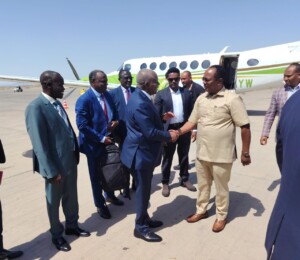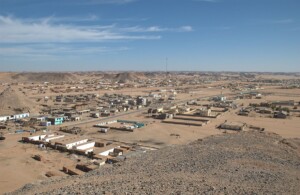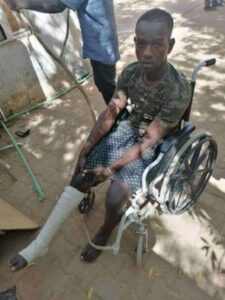Peace accord after six die in Port Sudan tribal violence
A peace accord has been reached by rival Beja clans after the death toll in the violence that has shaken Port Sudan this week climbed to six, with 28 people injured to date, according to the Red Sea state branch of the Sudanese Doctors Committee.
 Representatives of the Beni Amer and Hadendawa clans sign a peace accord in Port Sudan today, brokered by a joint delegation from the Cabinet, the Sovereign Council, and the Forces for Freedom and Change (RD Correspondent)
Representatives of the Beni Amer and Hadendawa clans sign a peace accord in Port Sudan today, brokered by a joint delegation from the Cabinet, the Sovereign Council, and the Forces for Freedom and Change (RD Correspondent)
A peace accord has been reached by rival Beja clans after the death toll in the violence that has shaken Port Sudan this week climbed to six, with 28 people injured to date, according to the Red Sea state branch of the Sudanese Doctors Committee.
A joint delegation from the Cabinet, the Sovereign Council, and the Forces for Freedom and Change, which arrived in Port Sudan on Tuesday, today brokered a pace accord signed by representatatives of the Beni Amer and Hadendawa clans.
The delegation, that includes members of the Sovereign Council Hasan Sheikh and Maj Gen Ibrahim Jabir, Minister of Interior Gen El Tereifi Dafallah, Minister of Infrastructure and Roads Hashim Tahir, Culture and Information Feisal Mohamed Saleh, as well as representatives of the Forces for Freedom and Change, Ibrahim El Sheikh and Feisal Shibu, later visited some of thise injured in the clashes in hospital.

in Port Sudan today (RD Correspondent)
Yesterday, Port Sudan again witnessed fighting between Beni Amer and Hadendawa tribesmen, who respectively support and oppose the eastern Sudanese United People’s Front rebel movement.
Listeners reported to Radio Dabanga that a curfew has been declared after clashes broke out on Monday when a group of tribesmen objected to a ‘welcome programme’ organised by supporters of El Amin Daoud, head of the United Popular Front for Liberation and Justice, who returned to Port Sudan from a year-long exile in France on Monday.

in this week's violence (RD Correspondent)
At least three people were killed in the initial violence and several others were injured.
Clashes in a number of districts in the city and attacks on several shops continued on Tuesday, which led to more casualties.
Regular forces have established tight security cordons around the districts and dispersed the crowds using tear gas.

in hospital today (RD Correspondent)

Prime Minister Abdallah Hamdok is scheduled to arrive in Port Sudan for a visit to the Red Sea state and Kassala tomorrow.
Tensions
The governor of the Red Sea state, Hafiz El Taj, and the head of the United Popular Front for Liberation and Justice, El Amin Daoud, exchanged accusations about the responsibility for the violence on Monday.
Responding to rising tension in anticipation of Daoud’s return to the country from exile in France on Monday, the governor said that he had agreed with Daoud to postpone the programme for his reception in Port Sudan until the situation would calm.
However, the armed resistance leader did not abide by the agreement, and proceeded to Port Sudan where he immediately held a mass meeting, the governor said.
Daoud stated he did not need any permission from the state government to address his supporters. He blamed the Red Sea state security forces for the outbreak of the fighting, pointing to the chaos that occurred after the end of the programme.
He told reporters in Port Sudan on Tuesday that it would have aggravated events had he not arrived on the scheduled date.
SRF
The Sudan Revolutionary Front (SRF) rebel coalition of which the United Popular Front for Liberation and Justice is a member, disavowed any connection with the events in Port Sudan.
El Hadi Idris, Chair of the SRF, accused “remnants of the former regime” of “fishing in troubled waters and seeking to stir up tribal strife throughout Sudan”.
He condemned all forms of violence, and calling on the eastern Sudanese adversaries to remain calm and stop inter-tribal fighting.
Radio Dabanga’s editorial independence means that we can continue to provide factual updates about political developments to Sudanese and international actors, educate people about how to avoid outbreaks of infectious diseases, and provide a window to the world for those in all corners of Sudan. Support Radio Dabanga for as little as €2.50, the equivalent of a cup of coffee.












 and then
and then